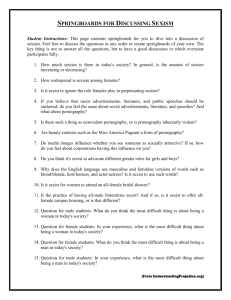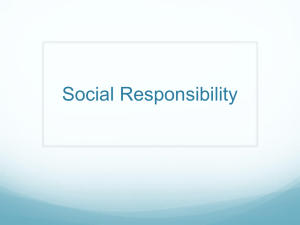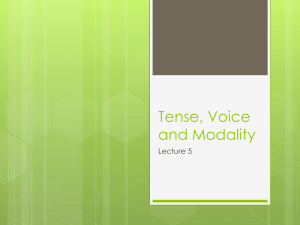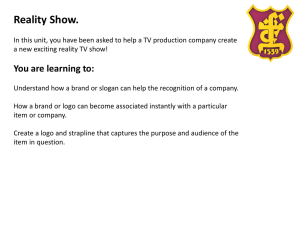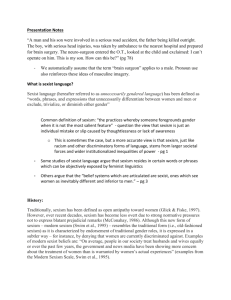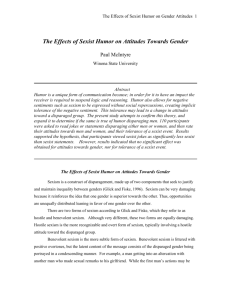Sexist Brands - University of Wisconsin
advertisement
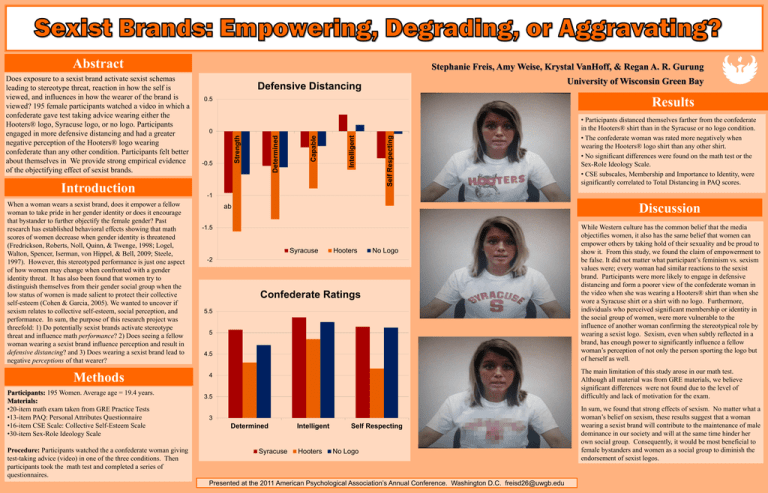
Abstract When a woman wears a sexist brand, does it empower a fellow woman to take pride in her gender identity or does it encourage that bystander to further objectify the female gender? Past research has established behavioral effects showing that math scores of women decrease when gender identity is threatened (Fredrickson, Roberts, Noll, Quinn, & Twenge, 1998; Logel, Walton, Spencer, Iserman, von Hippel, & Bell, 2009; Steele, 1997). However, this stereotyped performance is just one aspect of how women may change when confronted with a gender identity threat. It has also been found that women try to distinguish themselves from their gender social group when the low status of women is made salient to protect their collective self-esteem (Cohen & Garcia, 2005). We wanted to uncover if sexism relates to collective self-esteem, social perception, and performance. In sum, the purpose of this research project was threefold: 1) Do potentially sexist brands activate stereotype threat and influence math performance? 2) Does seeing a fellow woman wearing a sexist brand influence perception and result in defensive distancing? and 3) Does wearing a sexist brand lead to negative perceptions of that wearer? Methods Participants: 195 Women. Average age = 19.4 years. Materials: •20-item math exam taken from GRE Practice Tests •13-item PAQ: Personal Attributes Questionnaire •16-item CSE Scale: Collective Self-Esteem Scale •30-item Sex-Role Ideology Scale Procedure: Participants watched the a confederate woman giving test-taking advice (video) in one of the three conditions. Then participants took the math test and completed a series of questionnaires. 0.5 Results Intelligent Determined -0.5 Capable 0 Self Respecting Introduction University of Wisconsin Green Bay Defensive Distancing Strength Does exposure to a sexist brand activate sexist schemas leading to stereotype threat, reaction in how the self is viewed, and influences in how the wearer of the brand is viewed? 195 female participants watched a video in which a confederate gave test taking advice wearing either the Hooters® logo, Syracuse logo, or no logo. Participants engaged in more defensive distancing and had a greater negative perception of the Hooters® logo wearing confederate than any other condition. Participants felt better about themselves in We provide strong empirical evidence of the objectifying effect of sexist brands. Stephanie Freis, Amy Weise, Krystal VanHoff, & Regan A. R. Gurung • Participants distanced themselves farther from the confederate in the Hooters® shirt than in the Syracuse or no logo condition. • The confederate woman was rated more negatively when wearing the Hooters® logo shirt than any other shirt. • No significant differences were found on the math test or the Sex-Role Ideology Scale. • CSE subscales, Membership and Importance to Identity, were significantly correlated to Total Distancing in PAQ scores. -1 Discussion ab -1.5 Syracuse Hooters No Logo -2 Confederate Ratings 5.5 5 4.5 While Western culture has the common belief that the media objectifies women, it also has the same belief that women can empower others by taking hold of their sexuality and be proud to show it. From this study, we found the claim of empowerment to be false. It did not matter what participant’s feminism vs. sexism values were; every woman had similar reactions to the sexist brand. Participants were more likely to engage in defensive distancing and form a poorer view of the confederate woman in the video when she was wearing a Hooters® shirt than when she wore a Syracuse shirt or a shirt with no logo. Furthermore, individuals who perceived significant membership or identity in the social group of women, were more vulnerable to the influence of another woman confirming the stereotypical role by wearing a sexist logo. Sexism, even when subtly reflected in a brand, has enough power to significantly influence a fellow woman’s perception of not only the person sporting the logo but of herself as well. The main limitation of this study arose in our math test. Although all material was from GRE materials, we believe significant differences were not found due to the level of difficultly and lack of motivation for the exam. 4 3.5 3 Determined Syracuse Intelligent Hooters Self Respecting No Logo Presented at the 2011 American Psychological Association’s Annual Conference. Washington D.C. freisd26@uwgb.edu In sum, we found that strong effects of sexism. No matter what a woman’s belief on sexism, these results suggest that a woman wearing a sexist brand will contribute to the maintenance of male dominance in our society and will at the same time hinder her own social group. Consequently, it would be most beneficial to female bystanders and women as a social group to diminish the endorsement of sexist logos.

